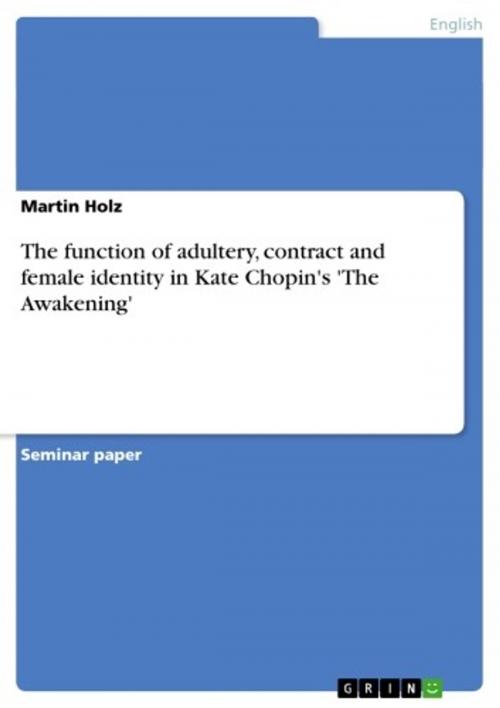The function of adultery, contract and female identity in Kate Chopin's 'The Awakening'
Nonfiction, Entertainment, Drama, Anthologies| Author: | Martin Holz | ISBN: | 9783640165698 |
| Publisher: | GRIN Publishing | Publication: | September 15, 2008 |
| Imprint: | GRIN Publishing | Language: | English |
| Author: | Martin Holz |
| ISBN: | 9783640165698 |
| Publisher: | GRIN Publishing |
| Publication: | September 15, 2008 |
| Imprint: | GRIN Publishing |
| Language: | English |
Seminar paper from the year 1999 in the subject American Studies - Literature, grade: 1,0, University of Cologne, 24 entries in the bibliography, language: English, abstract: In Kate Chopin's The Awakening, sexuality, love and marriage are negotiated in connection with the problem of a uniquely female identity which defies the ideas of Victorian prudery and seeks to represent the 'new woman'. But what precisely is the nature of Edna's awakening? Does the novel really convey a feminist tenor, and does Chopin succeed in exploring new cul¬tural and social options in the sphere of fiction? Three major aspects have to be analysed to il¬luminate this matter, namely adultery, the notion of contract and the question of a female iden¬tity, all of which are directly linked to the organization and stability of society in general and in American society by the end of the nineteenth century in particular. Considering the ubi¬quity of adultery - seen as a transgression against the marriage contract - in nineteenth-century novels, Tony Tanner postulates 'relationships between a specific kind of sexual act, a specific kind of society, and a specific kind of narrative' (1979: 12), all of which here imply a defini¬tion of woman's role on a social scale. As far as The Awakening is concerned, however, the case is far from clear because society's ideological hegemony is significantly diminished, though at no point relinquished. It is proble¬matic to speak of Edna's sexual liberation and emancipation for two reasons: firstly, there are no restrictive measures or even social sanctions like ostracism, and secondly, the ending is too ambivalent to interpret it from an exclusively feminist perspective. Nevertheless, Showalter is certainly correct in asserting that 'Chopin went boldly beyond the work of her precursors in writing about women's longing for sexual and personal emancipation'(1993: 170); contempo¬rary reviews and the reception history as a whole supply sufficient evidence of this as well as of the thesis that 'Chopin calls into question the ideologies and assumptions about women's place articulated by leading thinkers of her time' (Bauer/ Lakritz 1988: 47). But the text is neither a tract nor a pamphlet; it is an aesthetically composed novel which works quite differ¬ently due to its fictional status. This paper tries to clarify the complex set of ideas and tech¬niques that operate on the fictional level and is, moreover, designed to show their social and cultural relevance in the context of Kate Chopin's epoch while taking into account several approaches to the text.
Seminar paper from the year 1999 in the subject American Studies - Literature, grade: 1,0, University of Cologne, 24 entries in the bibliography, language: English, abstract: In Kate Chopin's The Awakening, sexuality, love and marriage are negotiated in connection with the problem of a uniquely female identity which defies the ideas of Victorian prudery and seeks to represent the 'new woman'. But what precisely is the nature of Edna's awakening? Does the novel really convey a feminist tenor, and does Chopin succeed in exploring new cul¬tural and social options in the sphere of fiction? Three major aspects have to be analysed to il¬luminate this matter, namely adultery, the notion of contract and the question of a female iden¬tity, all of which are directly linked to the organization and stability of society in general and in American society by the end of the nineteenth century in particular. Considering the ubi¬quity of adultery - seen as a transgression against the marriage contract - in nineteenth-century novels, Tony Tanner postulates 'relationships between a specific kind of sexual act, a specific kind of society, and a specific kind of narrative' (1979: 12), all of which here imply a defini¬tion of woman's role on a social scale. As far as The Awakening is concerned, however, the case is far from clear because society's ideological hegemony is significantly diminished, though at no point relinquished. It is proble¬matic to speak of Edna's sexual liberation and emancipation for two reasons: firstly, there are no restrictive measures or even social sanctions like ostracism, and secondly, the ending is too ambivalent to interpret it from an exclusively feminist perspective. Nevertheless, Showalter is certainly correct in asserting that 'Chopin went boldly beyond the work of her precursors in writing about women's longing for sexual and personal emancipation'(1993: 170); contempo¬rary reviews and the reception history as a whole supply sufficient evidence of this as well as of the thesis that 'Chopin calls into question the ideologies and assumptions about women's place articulated by leading thinkers of her time' (Bauer/ Lakritz 1988: 47). But the text is neither a tract nor a pamphlet; it is an aesthetically composed novel which works quite differ¬ently due to its fictional status. This paper tries to clarify the complex set of ideas and tech¬niques that operate on the fictional level and is, moreover, designed to show their social and cultural relevance in the context of Kate Chopin's epoch while taking into account several approaches to the text.















